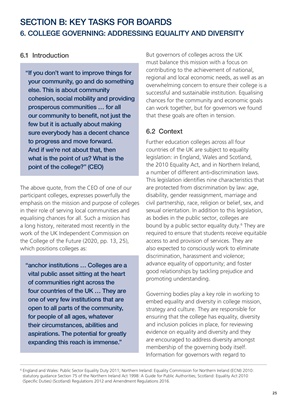
6.1��Introduction
The above quote, from the CEO of one of our
participant colleges, expresses powerfully the
emphasis on the mission and purpose of colleges
in their role of serving local communities and
equalising chances for all. Such a mission has
a long history, reiterated most recently in the
work of the UK Independent Commission on
the College of the Future (2020, pp. 13, 25),
which positions colleges as:
But governors of colleges across the UK
must balance this mission with a focus on
contributing to the achievement of national,
regional and local economic needs, as well as an
overwhelming concern to ensure their college is a
successful and sustainable institution. Equalising
chances for the community and economic goals
can work together, but for governors we found
that these goals are often in tension.
6.2��Context
Further education colleges across all four
countries of the UK are subject to equality
legislation: in England, Wales and Scotland,
the 2010 Equality Act, and in Northern Ireland,
a number of different anti-discrimination laws.
This legislation identifies nine characteristics that
are protected from discrimination by law: age,
disability, gender reassignment, marriage and
civil partnership, race, religion or belief, sex, and
sexual orientation. In addition to this legislation,
as bodies in the public sector, colleges are
bound by a public sector equality duty.6 They are
required to ensure that students receive equitable
access to and provision of services. They are
also expected to consciously work to eliminate
discrimination, harassment and violence;
advance equality of opportunity; and foster
good relationships by tackling prejudice and
promoting understanding.
Governing bodies play a key role in working to
embed equality and diversity in college mission,
strategy and culture. They are responsible for
ensuring that the college has equality, diversity
and inclusion policies in place, for reviewing
evidence on equality and diversity and they
are encouraged to address diversity amongst
membership of the governing body itself.
Information for governors with regard to
SECTION B: KEY TASKS FOR BOARDS
6.�COLLEGE�GOVERNING:�ADDRESSING�EQUALITY�AND�DIVERSITY
25
6 England and Wales: Public Sector Equality Duty 2011; Northern Ireland: Equality Commission for Northern Ireland (ECNI) 2010:
statutory guidance Section 75 of the Northern Ireland Act 1998: A Guide for Public Authorities; Scotland: Equality Act 2010
(Specific Duties) (Scotland) Regulations 2012 and Amendment Regulations 2016.
"�If�you�don't�want�to�improve�things�for�
your�community,�go�and�do�something�
else.�This�is�about�community�
cohesion,�social�mobility�and�providing�
prosperous communities … for all
our�community�to�benefit,�not�just�the�
few�but�it�is�actually�about�making�
sure�everybody�has�a�decent�chance�
to progress and move forward.
And�if�we're�not�about�that,�then�
what is the point of us? What is the
point�of�the�college?"�(CEO)
" anchor institutions … Colleges are a
vital public asset sitting at the heart
of communities right across the
four�countries�of�the�UK�…�They�are�
one�of�very�few�institutions�that�are�
open�to�all�parts�of�the�community,�
for people of all ages, whatever
their circumstances, abilities and
aspirations.�The�potential�for�greatly�
expanding this reach is immense."